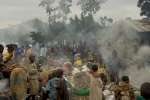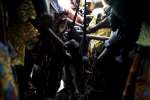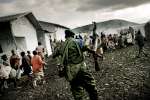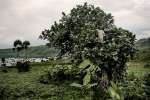- Text size
 |
|  |
|  |
| 
- عربي
Angolans head homewards by train from Democratic Republic of Congo
News Stories, 19 August 2014
KINSHASA, Democratic Republic of the Congo, August 19 (UNHCR) – A group of 500 Angolans headed homewards by train on Tuesday as the UN refugee agency launched a repatriation programme to end one of Africa's most protracted refugee situations.
The refugees took the train to Kimpese, 220 kilometres west of Kinshasa in Democratic Republic of the Congo's Bas-Congo province, and will spend Tuesday night in a transit centre there before being taken by bus Wednesday on the 80-km trip to northern Angola. They will registered and helped home.
Tuesday's returnees are among some 30,000 Angolans who wish to return on this operation, the third and final repatriation programme run by UNHCR since the end of the Angolan Civil War in 2002.
Twice-weekly return convoys will be organized from Kinshasa, Bas-Congo and Katanga provinces in the coming months. A further 18,000 former Angolan refugees wish to remain in the Democratic Republic of the Congo (DRC) and are in the process of local integration.
Before departure, the returnees go through medical screening, vaccinations and receive safe conduct papers, which serve as an identity document until they have their Angolan ID. Angola has assured that the authorities will help them with their reintegration once they are back in the country.
Since the end of June 2012, when the cessation clause was invoked, the Angolans in host countries have not been regarded as refugees because the situation in their country is no longer regarded as threatening to their safety or well-being. More than 78,000 Angolan refugees were still living in the DRC when cessation of refugee status was declared by the DRC authorities.
During a tripartite meeting in Angola last July, the Angolan and DRC authorities as well as UNHCR agreed to launch a final voluntary repatriation operation.
Angola's 1961-1975 war of independence and the civil war that followed, claimed tens of thousands of lives and displaced some 4 million people, including 550,000 who became refugees. Most fled to neighbouring countries such as Democratic Republic of the Congo.
Although most former Angolan refugees in the region have gone back home since 2002, some 73,000 Angolans remain in exile in countries such as Democratic Republic of the Congo (48,000), Zambia (23,000), Namibia (1,600) and the Republic of Congo (400). The DRC, Namibia and Zambia have offered opportunities for local integration, while South Africa has issued the Angolans with special immigration permits to allow them to stay.















































